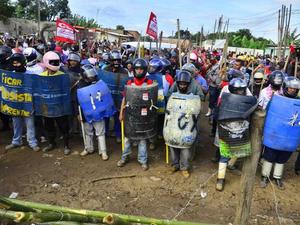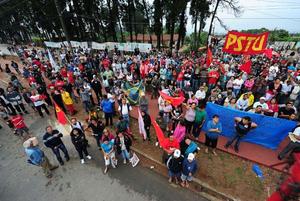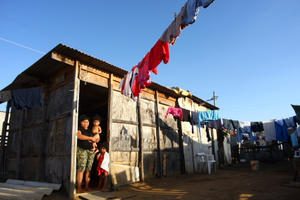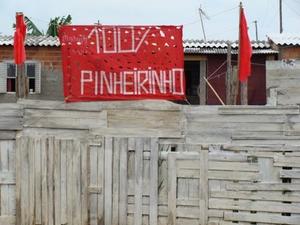On January 22, an estimated 6,000 people were evicted from Brazil’s Pinheirinho favela on the outskirts of São Paulo. Backed up by armored cars and helicopters, some 1,800 state and municipal police descended on the site without warning, using tear gas, rubber bullets, and truncheons to disperse frightened residents.
In images widely circulated by Brazilian social media, some residents resisted the violent occupation with  Residents resist eviction. Credit: Indymedia.org.uk.improvised weapons and homemade body armor. Numerous videos posted on YouTube captured incidents of police brutality. Reports indicate scores of injuries and at least 30 arrests, with unconfirmed rumors of up to seven deaths.
Residents resist eviction. Credit: Indymedia.org.uk.improvised weapons and homemade body armor. Numerous videos posted on YouTube captured incidents of police brutality. Reports indicate scores of injuries and at least 30 arrests, with unconfirmed rumors of up to seven deaths.
According to a detailed account by Global Voices, the long-abandoned 250-acre site has been occupied since 2004 by more than 1,500 landless worker families. The community developed into a settled neighborhood, complete with churches, libraries, shops, and soccer fields.
The land belongs to the bankrupt estate of Lebanese-born Naji Nahas, a notorious speculator jailed briefly in 2008 for “financial crimes.” He reportedly owes $15 million in back taxes to the municipality.
 Residents rally. Credit: indymedia.org.ukIn part, the episode stems from a judicial and political dispute between the state of São Paulo, run by the opposition Social Democratic Party (PSBD), and the federal Workers’ Party (PT) government. After a state court upheld the state government’s request to repossess the land (for purposes not made clear), a federal court suspended the order. The federal government said it would buy and regularize the land and turn it over to the residents under a government program. But a second state court reversed the ruling, and before the action could be further appealed, the state moved to occupy the favela.
Residents rally. Credit: indymedia.org.ukIn part, the episode stems from a judicial and political dispute between the state of São Paulo, run by the opposition Social Democratic Party (PSBD), and the federal Workers’ Party (PT) government. After a state court upheld the state government’s request to repossess the land (for purposes not made clear), a federal court suspended the order. The federal government said it would buy and regularize the land and turn it over to the residents under a government program. But a second state court reversed the ruling, and before the action could be further appealed, the state moved to occupy the favela.
But the real story behind the evictions is about poverty, housing shortages, unequal land distribution, and the consequences of Brazil’s economic and development boom. While six out of 10 Brazilians are now thought to belong to the “middle class,” another 11.5 million live in substandard and often illegal housing—up from 4.5 million in 1991, according to recent government reports.  Pinheirinho housing. Credit: Kathiao/ flickrBrazil already has a deficit of some 7 million housing units—and now, another 1,600 homeless families.
Pinheirinho housing. Credit: Kathiao/ flickrBrazil already has a deficit of some 7 million housing units—and now, another 1,600 homeless families.
Atila Roque, director of Amnesty International in Brazil, says that the Pinheirinho action violates a “raft of international standards” that require Brazil to protect residents from forced eviction, especially without the provision of alternative housing. “As the country booms,” he says, “tens of thousands of poor families are being removed to make way for infrastructure and private development projects, without receiving adequate protection.”
According to Brazilian philosopher Rodrigo Nunes, the real culprit behind the Pinheirinho evictions is the “gargantuan developmentalism” that characterizes the left-leaning government of President Dilma Rousseff, accelerated by the upcoming 2014 World Cup and the 2016 Olympics. The National Coordination of World Cup Committees estimates that up to 170,000 people across the country will be evicted in preparation for these events. Some activists put the number as high as 1.5 million. Key transit, stadium, and port development  Credit: indymedia.org.ukprojects in Rio de Janeiro have led to substantial charges of forced displacement by international human rights organizations.
Credit: indymedia.org.ukprojects in Rio de Janeiro have led to substantial charges of forced displacement by international human rights organizations.
The federal government, which funds and supports these local infrastructure and private development projects, has done little to mitigate their adverse consequences. With respect to Pinheirinho, President Dilma Rousseff’s silence to date has been deafening. While two cabinet ministers have indicated their “surprise” and “regret” about the incident, Rousseff has not issued a formal statement.
Brazil’s political left, says Nunes, has been slow to critique the government’s growth-obsessed policies, including the collateral damage resulting from urban development projects. However, popular organizations like Brazil’s Landless Workers’ Movement (MST) have condemned the police action at Pinheirinho as an “act of war.” And thousands of trade unionists, indigenous groups, and neighborhood activists will have an opportunity to confront Rousseff later this week when she addresses the World Social Forum in Porto Alegre, where the issue of Pinheirinho is sure to be addressed.
For more coverage on Brazil, see the March/April 2011 NACLA Report, “Lula’s Legacy in Brazil,” or Emily Achtenberg’s June 9 post “Brazil Without Poverty? Dilma’s Double Discourse.” Read more from her blog Rebel Currents.

